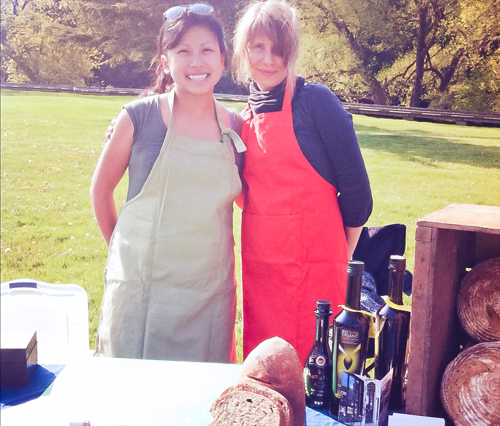
Calantha Elsby says her work as an instructional technology specialist at U of G gives her the opportunity to do what she’d always wanted to do: teach. “But I get to teach teachers, which I like even better,” she says.
She also gets opportunities to share her knowledge with the wider community, and will be doing that on Feb. 21 when she leads a session titled “Sink Your Teeth In: Getting Started with Food Writing” at a writers workshop hosted by the U of G library.
Food writing is a departure from her day-to-day work but is another of Elsby’s passions (see her blog at Piecurious.ca).
Elsby studied first at Western University and then at Queen’s University, where she earned a master’s degree in political theory. It was during her time at Western that she began working in the instructional technology resource centre, giving her the background needed when a position became available at Guelph.
Much of her work involves training faculty and staff how to use technology to provide better learning environments. That includes new faculty unfamiliar with the programs used at Guelph, experienced faculty wanting to add technology to a course, and faculty who want to update their skills when technology changes.
“We also research new technology to help determine what would be useful for people here, so we need to keep on top of what is happening,” she says.
As well as teaching instructors, Elsby and her colleague Jason Thompson provide training for support staff who may be asked to assist instructors.
Elsby says her favourite part of the job is problem-solving. “I like it when a professor says to me, ‘This is what I want to happen in my classroom; can you find a way to make it work?’” Helping to make teaching more engaging and effective is important to her, too: “It’s not about the technology; that’s just the tool. It’s about the learning.”
The benefits of teaching with technology may be most obvious in large classes: how else can you engage with a class of 500 students?
Social media provides another approach to engagement, and Elsby teaches faculty to use these as well. She says using Twitter, Facebook, blogging and other online connections not only help to keep students involved in the course work but prepare them for the working world. “Employers today want to hire people with skills in these areas – and they are skills that cross job lines.”
Her approach to food, though, is surprisingly low-tech. After taking the job at U of G, she moved to Elora and started up the Elora Bread Trading Company with friend Sonia Cheng. They make sourdough bread during the summer to sell at the Elora Farmers’ Market, working from 7 p.m. Friday to 7 a.m. Saturday to make 80 to 90 loaves for their customers. They’ve outgrown the rented kitchen they used last year and will be moving into a new one this coming summer.
Elsby says they use only sourdough starter to help the bread rise, no yeast. “The difference in the flavour is incredible.”
She writes about bread and her other baking adventures in her blog, and has also sold some food-related articles to magazines. “I don’t fit the typical mould of food writing, and that’s one of the things I want to talk about in the workshop,” she says. “Food writing is not just recipes or restaurant reviews; there are many different approaches. You might even write fiction with a background related to food. We’ll discuss the options, including how to start a food blog, and I’ll have resources for people to check out.”
Elsby will also address some of the fears experienced by new writers. “Many people who want to write are afraid they won’t be good at it. I was afraid to send out my first query letter, but I did it and sold the article,” she says, promising that the workshop will be inspirational and informative but not dictatorial. “I think it should be helpful for anyone interested in writing about food in any way.”